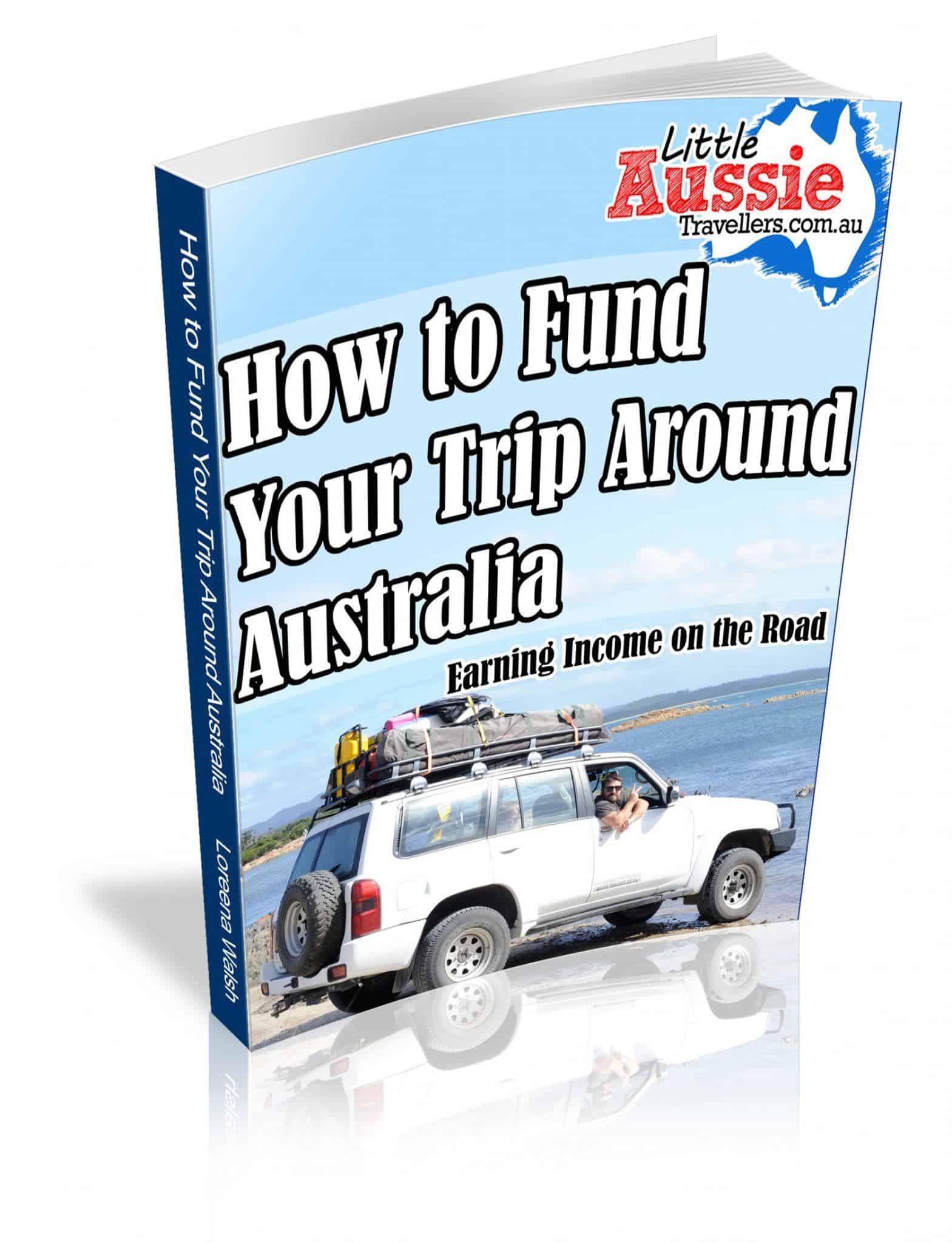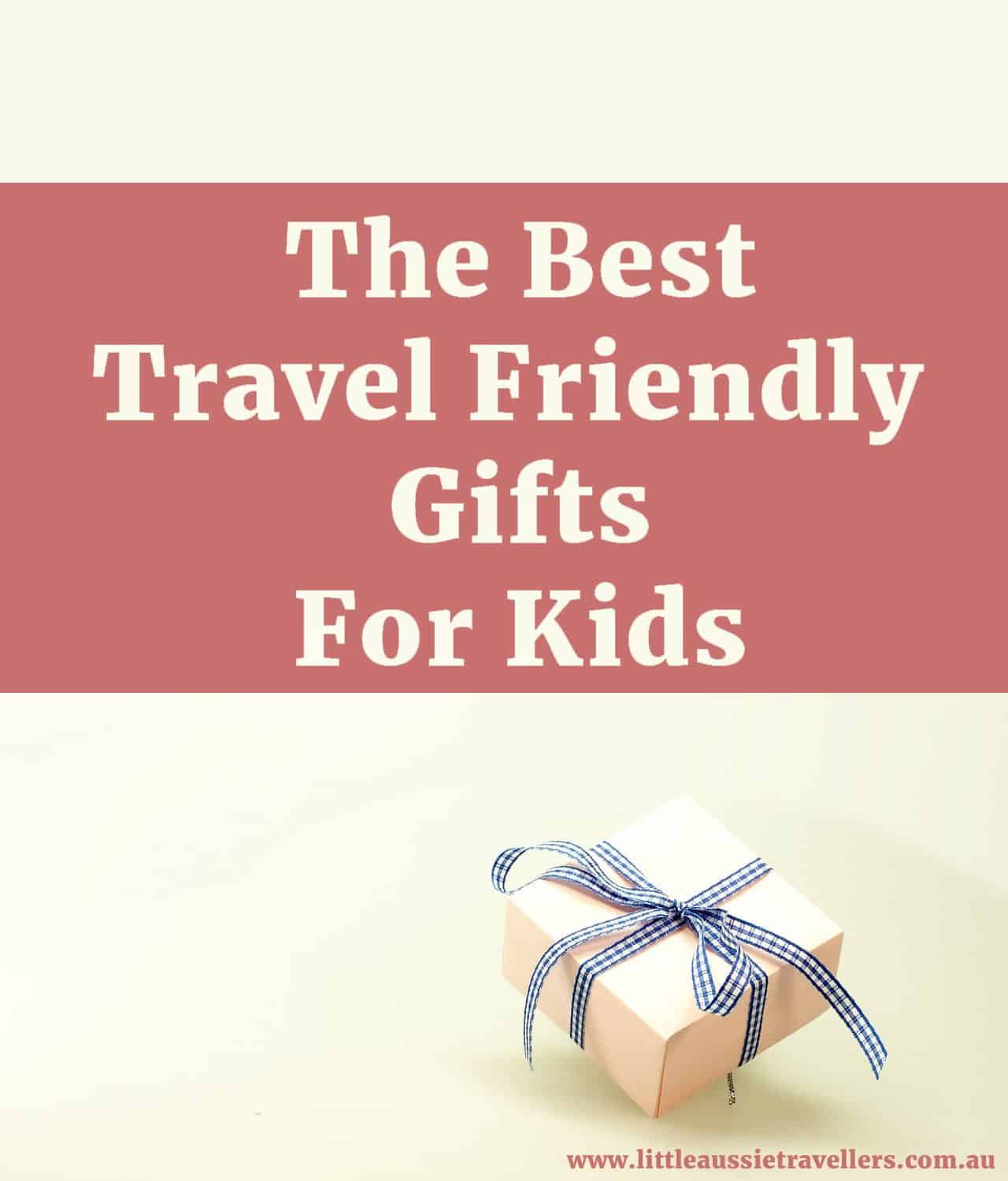
by Loreena Walsh | Australian Travel News, Family Travel, Featured Posts, Gear Guide
There is so much excitement for kids who are heading off to travel, and often friends and family want to buy farewell gifts for kids or their parents to send them off. What many people don’t realise though, is that space is really limited for travelling families, and weight is also a constant juggle – there’s only so much that is legally able to be carried, so buying thoughtful gifts is really lovely, but we’ve got some great tips and ideas for the best travel gifts for kids or families who are about to head off on their trip around Australia.
I’ve decided to update this post for 2019, as now our children are older, things have changed. A lot. Both of my teenagers are now well into skincare & makeup for example, so something for my daughter like a gorgeous Beauty Advent Calendar would be practical and fun. So would I recommend the same gifts for travelling kids as I did when the kids were smaller? Some of them, but there are some other ideas I think are great options, so I’ve added a few more.
We all know there are long car rides, and hours of down time when we’re out on the road travelling, so figet toys are the perfect solution to keep kids occupied.
Fidget toys are generally small, compact and easy to take on the road without taking up too much of your valuable packing space. Brands such as Tangle fidget toys and Speks fidget and manipulative toys for children and adults are such a great solution.
If you haven’t looked at these types of toys for kids, they’re a great option for packing small and light and still having fun activities on the road.
2. Buy A Great Travel Journal for Kids or Adults.
This is still one of the best travelling gifts for kids. It’s actually the perfect travel gift idea for the entire family!.
It doesn’t matter if it’s Mum and Dad, or for the kids; travel journals are the perfect way for travellers to capture all the treasured moments on their journey. From destinations that are loved, to special experiences, drawing pictures, writing stories, sticking postcards, dried leaves, dried flowers, adding photographs. Journals help to create a timeless keepsake that will be a treasured family item for many, many years to come.
One thing I realise about travel, is that while you’re there, in the action, soaking up the landscapes, the conversations, the ever-changing destinations, that you never think you’ll forget. There are parts of our trip that I can barely remember, but having a journal to look back on has ensured that I can re-live the moment, and it’s such a fabulous glimmer of joy reading and remembering the little things that happened along the way that were special to us!
3. Travel-Friendly Art & Craft Supplies.
Whether it’s to write in their journal, help with their schoolwork or send letters and pictures back home to friends and family, travelling kids will love art and craft supplies to take along with them. Watercolour paints are a great option as they aren’t as messy as other paint options and don’t take much to clean up.
Pencils and pens are perfect for writing, drawing and colouring, as are notebooks and writing paper, both of which will come in handy for keeping kids occupied on long journeys and if they want to jot down notes or create artwork to represent their travels.
For our children’s travel journals we began with an A5 folder, with loose inserts from Office Works. That way they could move pages around, add photos once we’d had them printed, brochures, keepsakes, and remove a page if they felt like they didn’t want to include it any more. They also used their art and craft supplies to send special pictures and letters home to family and friends. The gift of stamps is also a great idea if you’d like to receive a postcard from your little adventurers!
4. Binoculars Make Great Travel Gifts for Kids.
Binoculars are a great gift idea for kids who are travelling. The ability to spot things at a long distance will help kids feel immersed in their surroundings and see things they won’t otherwise be able to spot. Wildlife, interesting scenery, they’ll love the faraway goodies they’ll spot through their new binoculars.
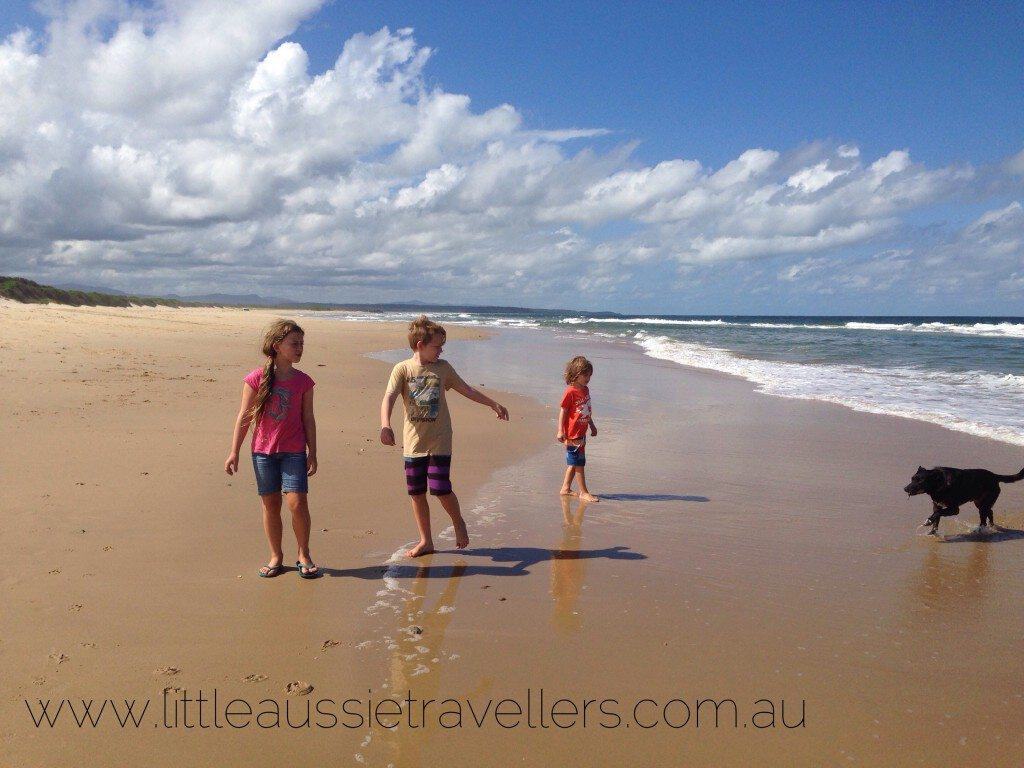
5. Compact & Multi-use Toy Ideas for Travelling Kids
One of the basic toys we considered a must-have when we hit the road was Lego. Not only is it a great toy for building things like we all know, it’s also a wonderful tool for learning maths too! Lego is great for solo play or group play and suitable for kids (and adults) of all ages. Other great ideas include block games like Jenga, the blocks for this game can not only be used to play but also double as building blocks or math blocks too. Marbles, decks of cards, Uno, travel versions of games like scrabble and battleship are all available too. Look for games and toys that are compact or can be taken out of their bulky boxes and easily stored.
6. Tech Gifts for Travelling Families
Depending on the ages of the children, cameras and other tech gadgets can work really well. For cameras, polaroids work well for adding scenic photos or selfies into travel journals, but digital cameras work well for capturing lots of photos and deciding what to print later. Expensive cameras aren’t necessary, just look for something of reasonable quality and the kids will love it. Cameras that are shock proof and waterproof would definitely be an ideal, although more expensive option. Ipods and Ipads are also a much loved travel gadget, as are iTunes gift cards a loved gift for kids who own these devices.
7. Everyday Necessities Especially For Older Children and Teens.
As I mentioned above, now are children are older, I reflect on the things that would make sense for tweens and teens to be gifted for travel. Personal care items are a wonderful gift idea for older kids. I mentioned Beauty Advent Calendars, and my daughter would absolutely adore a gift like this both when we were travelling or now we’re settled down. The bonus is that the items inside are compact in size and great for travelling.
For my son, who now shaves, shave gear, spare razors, cologne, all of this can be expensive to buy on the road in more remote places, so a little gift basket of goodies would be a fabulous idea.
Of course no matter what, gifts that come from the heart are always welcome by any family. When it comes to travel gifts for kids, If you think about items that kids can use, are small, compact and won’t just take up space, you’ll have happy kids and happy parents, and most importantly, happy, smiling travellers!
What about other special events like Mother’s Day gifting, Father’s Day gifting or even Christmas gift ideas for living on the road? We’ll cover those in another post soon.
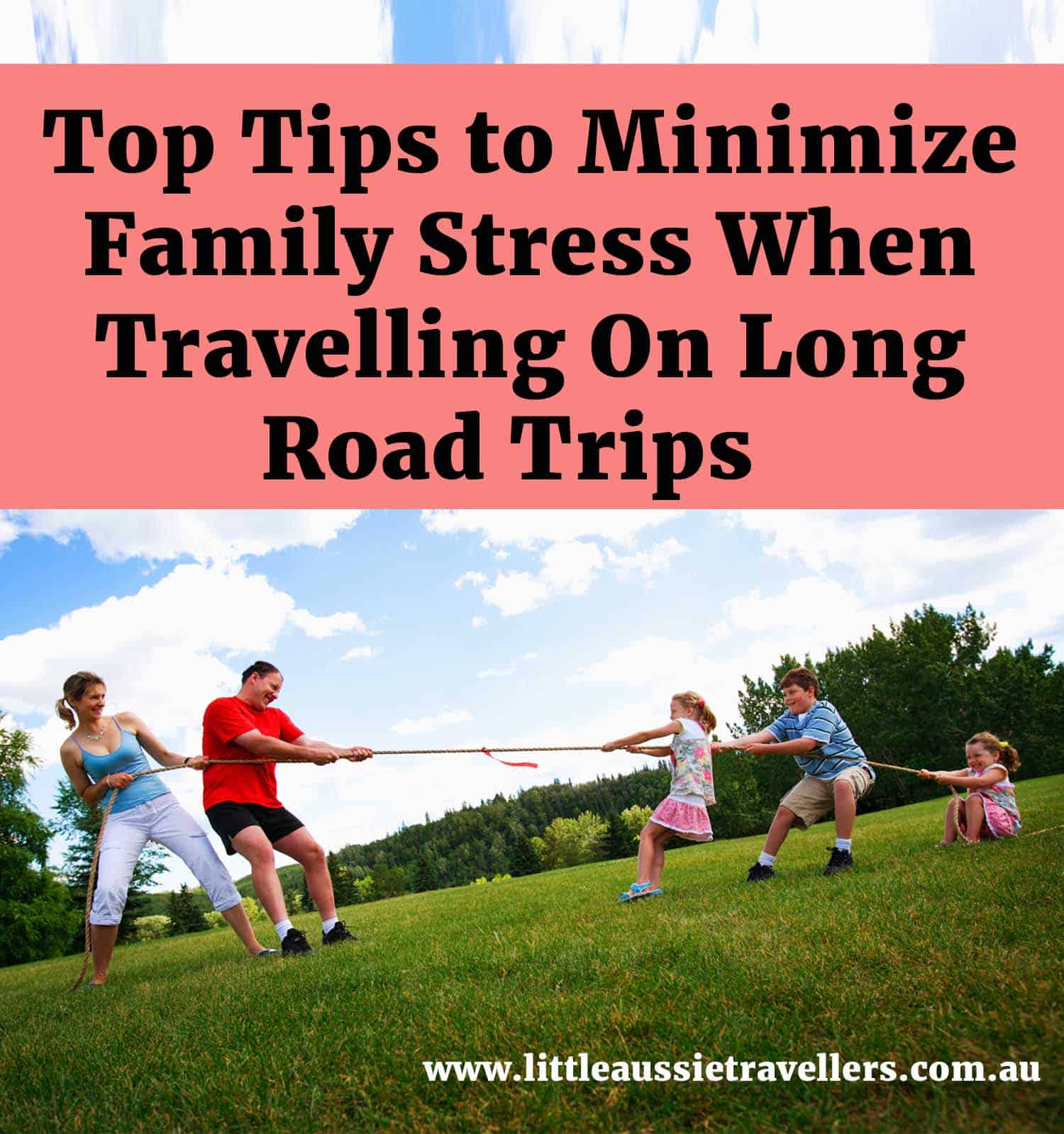
by Loreena Walsh | Family Travel, Featured Posts
We get questions about this all the time. After months, or years of planning for their dream of travelling Australia with kids, the first few weeks of the journey could be described as little more than hellish. Constant fighting, tiredness, kids won’t do schoolwork, adults can’t stand to look at each other, nobody will pull their weight, men are grumpy, women feel unappreciated. Makes you want to plan your family travel around Australia right now doesn’t it?
Possible Causes of Tension for Travelling Families?

Let’s take a look at this shall we? Your entire world has just changed, the kid’s entire world has just changed.
- The environment is constantly changing.
- Nobody knows what the new ‘rules’ are for this new life.
- The accommodation is way more restrictive than a house; there’s no locking yourself away in your bedroom to escape each other.
- There’s packing up and setting up, a stressful experience in itself.
- Hours of driving to get to new destinations.
- Often the family diet goes through some changes.
- Schooling changes to something new & unknown.
- Homesickness happens, especially during tense and stressful times.
- There’s normally restricted ability to relax or tune out activities like watching television or playing video games, because power and electronics are much more restricted when travelling on the road.
- You have to get to really know each other as a family; not just exist together.
- There is NO HIDING from problems that existed before you hit the road.
Do NOT Despair, Family Travel Is Worth The Tough Times!
So, I’ve just shared the most common reasons for why there’s so much tension in your new travel lifestyle, and it may sound overwhelming. If you haven’t left to travel yet, it may be causing you to doubt heading off at all.
I promise, that although your trip around Australia may challenge you as a family; it is going to make you stronger, closer and create memories that will enhance your life in a way that isn’t possible any other way.
We get emails, and questions via our Facebook page asking if other people argue, is it normal, what can be done to fix it, and the answer is YES!
Most people we speak to have suffered the struggle of getting used to their new lifestyle. Generally at the beginning of the adventure, tempers are short, patience is thin, and it seems as though nobody will ever be happy about being on the road, but that just isn’t true.
Arguments are common, frustration is common and a feeling of uncertainty and even regret are all commonly reported by families who are starting their life on the road.
It does get better, and we’re going to take a look at what you can do to make travel as a family less stressful.
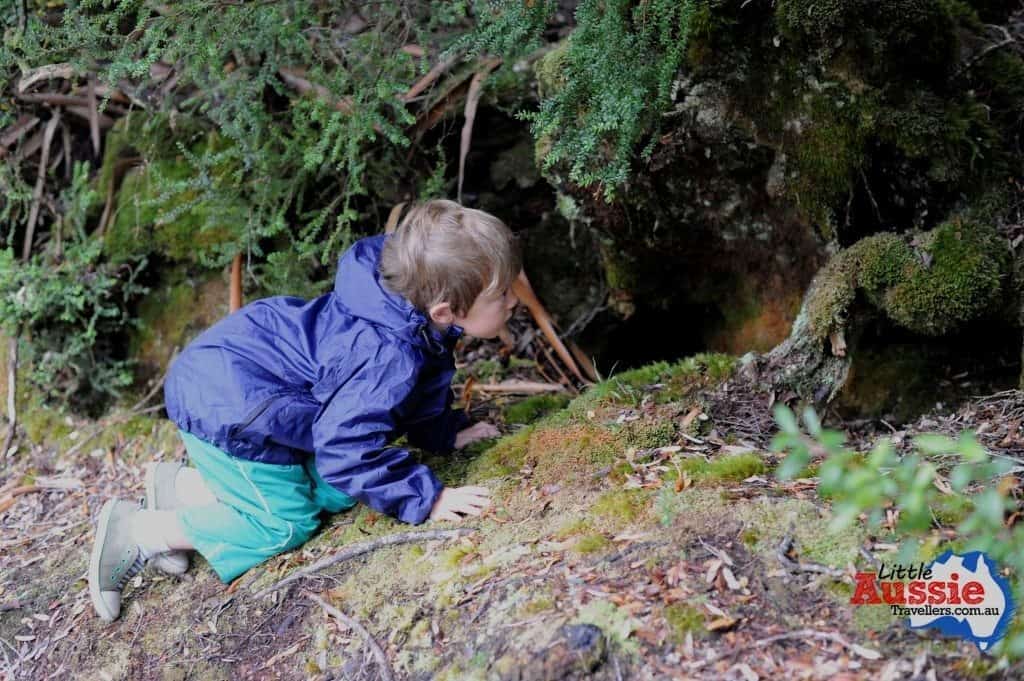
Strategies to Decrease Stress Related to Family Travel
So, now you know it’s ok to stress and feel tension, because truly, it happens to everyone; you want to know how to decrease the problem right?
Here are our top tips for keeping things stress free and happy on the road:
Allow at least 4-6 weeks to settle in to your new lifestyle. Adjustment takes time, and it’s OK if everything doesn’t feel perfect right away.
Find a nice place and stop for a while. The faster you move, the more stressful your travel is likely to be. If things are feeling tense, then find a lovely campsite and stop. What are you rushing for anyway? This time is meant to be spent bonding, getting to know each other better and enjoying your surroundings. Rushing helps no-one, so take in the surrounds, do some exploring and put some roots down for a short while; it can make all the difference.
Join in happy hour. For parents on the road, it can seem a constant battle to maintain healthy adult relationships. Get dinner sorted early, or have something easy, that way when all the child-free travellers are enjoying happy hour together (which normally happens around family dinner time in campsites) you’ll be able to join in too and share stories.
Talk it out! Unlike life at home where everyone could disappear into their own world, life in a camper or caravan doesn’t allow for dodging confronting emotions. Get things out of the way, sit down and talk honestly about what’s irritating you, how everyone else feels and make a plan to move forward feeling positive.
Have some alone time: This one can be tough, but if you like to read, make some time to do that. Like to visit the shops and there’s some handy then do a solo shopping trip. Go for a short walk, have a swim, whatever it is that will give you some inner peace, make time for it. This is really where parents need to work together to give the other time for a break. It really does make all the difference with being able to handle the more stressful events that travelling will throw at you.
Cut each other some slack: We all go into travelling with expectations of what it will be like and how ‘it’ will look. Chances are actually being on the road may look very little like your imagined trip of a lifetime. That is OK! Breathe, relax and let everyone find their sweet spot for travelling. If your children are older they may be missing friends, cut them some slack, let them call to say hi. If school work seems to do little but spark arguments, take a couple of days off, resentment won’t achieve anything positive anyway.
Be Flexible: This is possibly the most important tip of all. Travel should be about adventures and togetherness, not strict schedules and deadlines. Learn to be flexible, if everything isn’t perfect it doesn’t matter, if you’re late it doesn’t matter, if you need to stay an extra day or three somewhere it doesn’t matter. Let go of your preconceived ideas and enjoy what is, because it will be over before you know it.
Do you have any tips for easing stress for long term travel? Did you have a bumpy start?
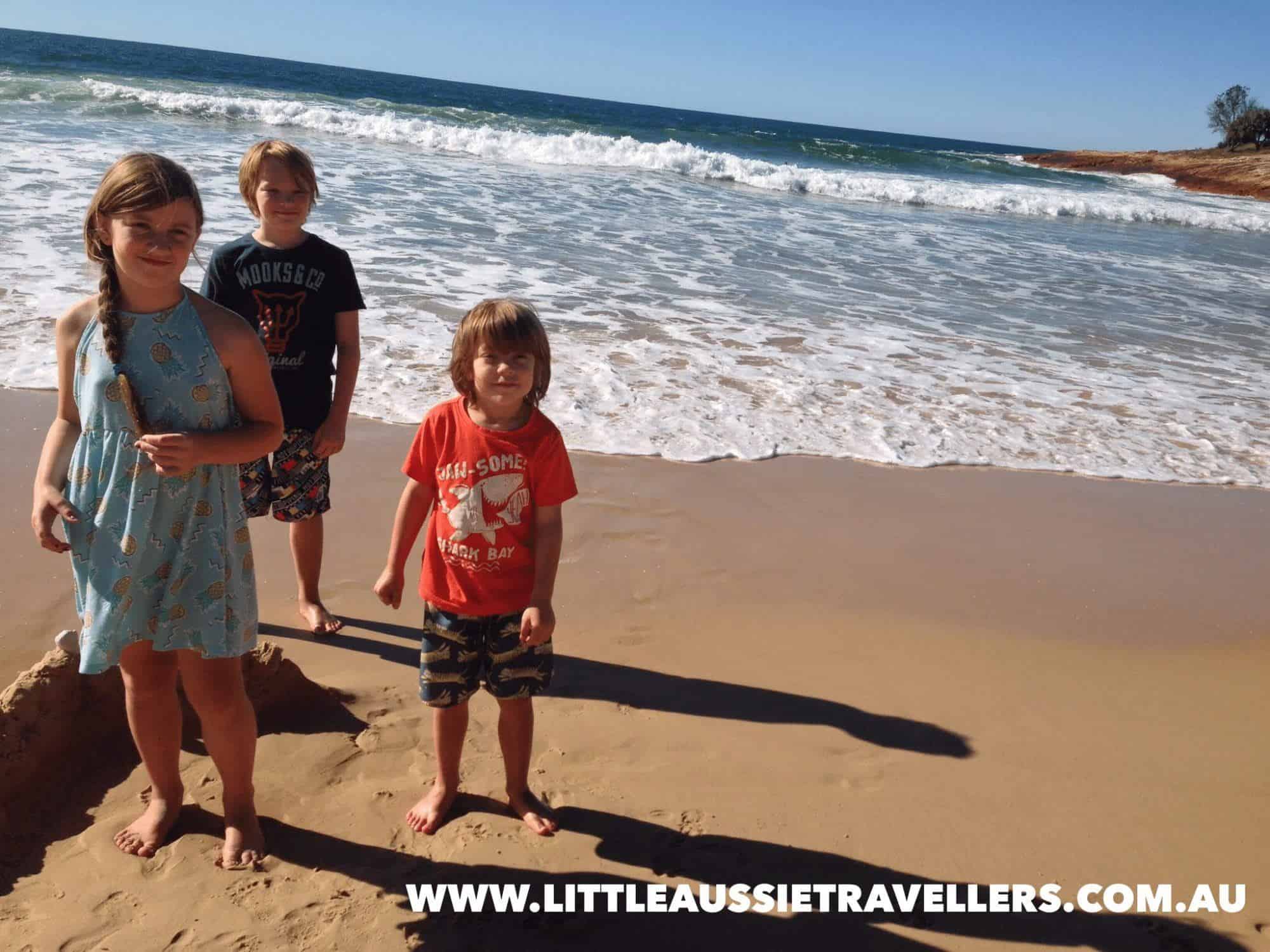
by Loreena Walsh | Family Travel
One thing we get asked a whole lot is what is the best age for kids to travel Australia on a family road trip?
Our answer to anyone is: Go the very second you can!

But, of course, life’s not always as simple as that, is it? Having your children out exploring Australia at any age, is an enriching experience for the entire family, no matter the age or length of time, getting out on the road, sharing unique adventures with your kids is truly a life-changing opportunity.
That being said, here’s some of the biggest considerations for when you should head off on your big lap of Australia and our thoughts, which have changed since we originally began planning, hit the road, and then became stalled again:
How long are you planning to travel Australia, and what suits kids?
The length of time you want to head off on the road can impact the best age for your child to go on your Aussie adventure. If you’re only doing a short trip and need to move quickly in order to see a whole lot, then you’ll need to consider how well your children will travel.
For younger children, being stuck in a car seat for hours on end can be really frustrating and it’s hard to communicate as a parent that you’ll arrive soon. Young children just want to move and play.
You know how much travel time your children can cope with, and go with what suits your child. Ours were doing 5 hour car trips from the time they were born; as we’d often go and visit family. As people moved further away, that stretched into 7-8 hour car trips, but I know lots of kids who would never have coped with that (as well as some parents who would have considered a trip that long their worst nightmare).
Slow travel means you can break travel into shorter distances, making it a little easier for everyone.
How much do you want to see during your Aussie Road Trip?
If you’re wanting to take in the entire country in just a matter of months, this is likely to end up a stressful experience no matter the age of the kids. In our experience, taking quality time to see fewer things is a better recipe for family travel success!
Our first ever long trek, we knew we had 3 weeks, a hire car and a tent. We also knew we wanted to see Central Australia, and so we travelled from Darwin, through Kakadu and down the centre to Adelaide over a three week period when the kids were aged 18 months, 3 and 5. They were all good travellers and although we were moving pretty quickly, they coped well with it. That pace wouldn’t have been sustainable for longer travel, but it worked well to get a taste of adventure.
Knowing how long you’ve got, and how much you want to see, it pays to make certain areas or landmarks a priority and focus your travels around these places.

What Type of Accommodation are you Travelling With?
Is your accommodation cozy and child friendly? There are families out and about in tents, camper trailers and caravans and other options too, but your type of accommodation may affect your child’s comfort and stamina for travel.
While the Jayco Swan was a good choice, and I’d use one again for shorter trips; for us it became awkward for our children to share the queen bed together and we knew that it wasn’t going to be a viable long-term solution, and so bunks in a caravan became our goal.
Comfort definitely plays a role in how well the entire family copes with the travel process, and budget options are awesome, and great, it’s better getting out and exploring than not at all, so it shouldn’t be a deterrent but it should be a consideration for what your children will cope with.
What is your Travel Goal?
Why do you want to head off? Is it for freedom, to leave behind an unhappy job, to take a short break, do discover a new region to settle down in? Knowing your goal and what you hope to get out of the process, will help guide you when deciding if your children are at the right age to undertake that goal achieving travel with you.
Life is Meant to be an Adventure!
It doesn’t matter what you decide, how old your kids are, how far you get, how many places you do or don’t see, the entire process and journey is meant to be a wonderful adventure. It is not going to be a perfect adventure. Things will go wrong. Things will be amazing. Things will be stressful. Things will be awesome and unforgettable.
Just like most things in life, there’s never a perfect time, other than this very moment we’ve been given to make the most of the time we have.
Happy travels, comment below if you have any questions or drop us an email!

by Loreena Walsh | Family Travel
There’s that old saying you don’t know what you have until you lose it, and it seems I’ve discovered that really is true, I’d never really thought of travel at home as something I’d be crazy about!
When we left the Mid North Coast, it was with a hint of defiance in our attitudes, one that said we’d never return; we were off to discover grander, more amazing things around Australia. So, other than short visits, we spent a couple of years ignoring our home region and instead savouring inland New South Wales and Tasmania, both of which are amazing areas in their own right and both are regions we’ll return to again and again.
The one thing I didn’t expect when we stopped home for a while was just how much I’d come to realise how amazing this area is.

When you live somewhere, you become a little desensitised to it’s awesomeness. So lately we’ve been heading out and exploring all the areas we’ve taken for granted over the years and discovering the beauty of beaches and bushwalks with the kids that we hadn’t stopped to enjoy when we were working and rushing through life when we had our business.
I’m sure, like us you’ve likely ignored some amazing places that are just around the corner from your home. If you’re sitting and waiting impatiently to begin your trip around Australia then don’t be disheartened and frustrated, seek out things close by. If you’ve finished your trip, then you know you’ve likely been ignoring lots of great places.
1. Seek out Museums, Galleries and Cultural Displays
I hate to admit this, but we’ve never taken the kids to some of the most wonderful historical displays in Port Macquarie. We’ve never visited the maritime museum, or Innes ruins (even though my family came to the area via a distant grandmother working for Major Innes there) and the list goes on. We tend to gravitate to these sorts of places when we’re exploring other regions so it’s high on my priority list to do before we leave again, and you should make it high on your priority list to get out and explore and learn about history and culture of the region you live.
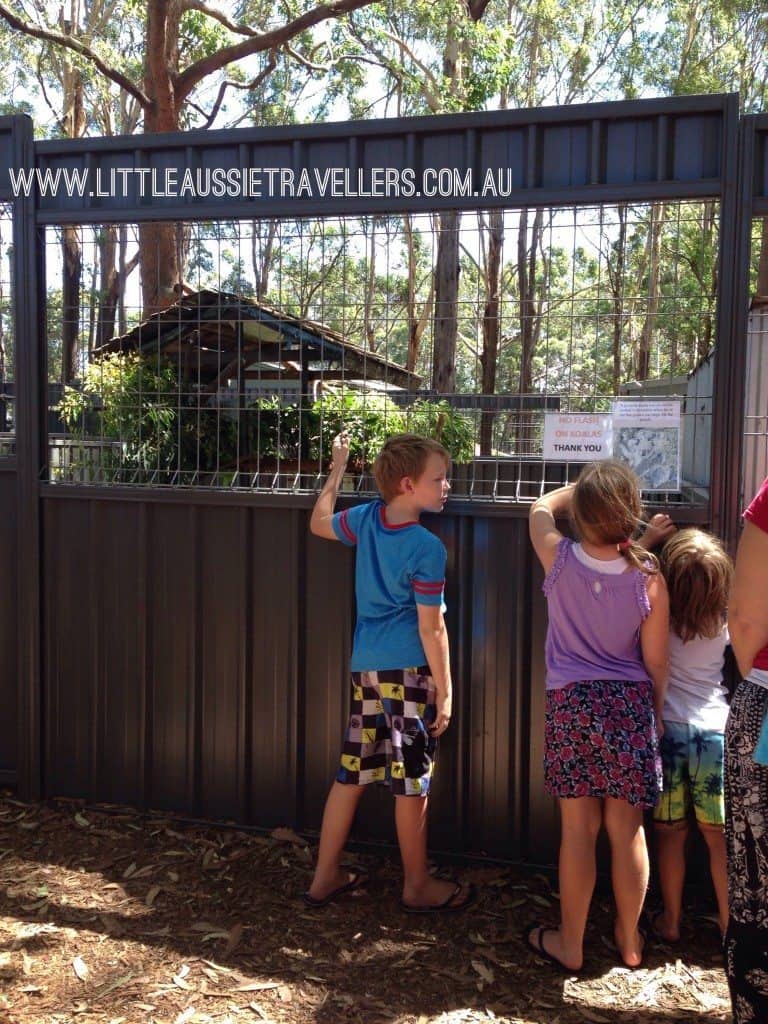
2. Volunteer & Meet the Community
This is also something high on my list, both around our local area and when we are out on the road, and our children are getting old enough to volunteer too. Not only does volunteering give back to the community, it also helps you to meet people you may not otherwise meet, and learn about areas of the community you might not otherwise have the chance to. Whether it’s a soup kitchen, animal shelter or environmental organisation there’s lots of things to get involved with that might just surprise you!
3. Find hidden nooks and secret spots
I’m still learning about new areas around the Mid North Coast, and the best way to uncover hidden spots is to get chatting to other locals. Get out of your comfort zone and steer clear of all the places you gravitate to out of habit; instead track down new walking trails, beaches, stores, interest groups or attractions and give them a try.
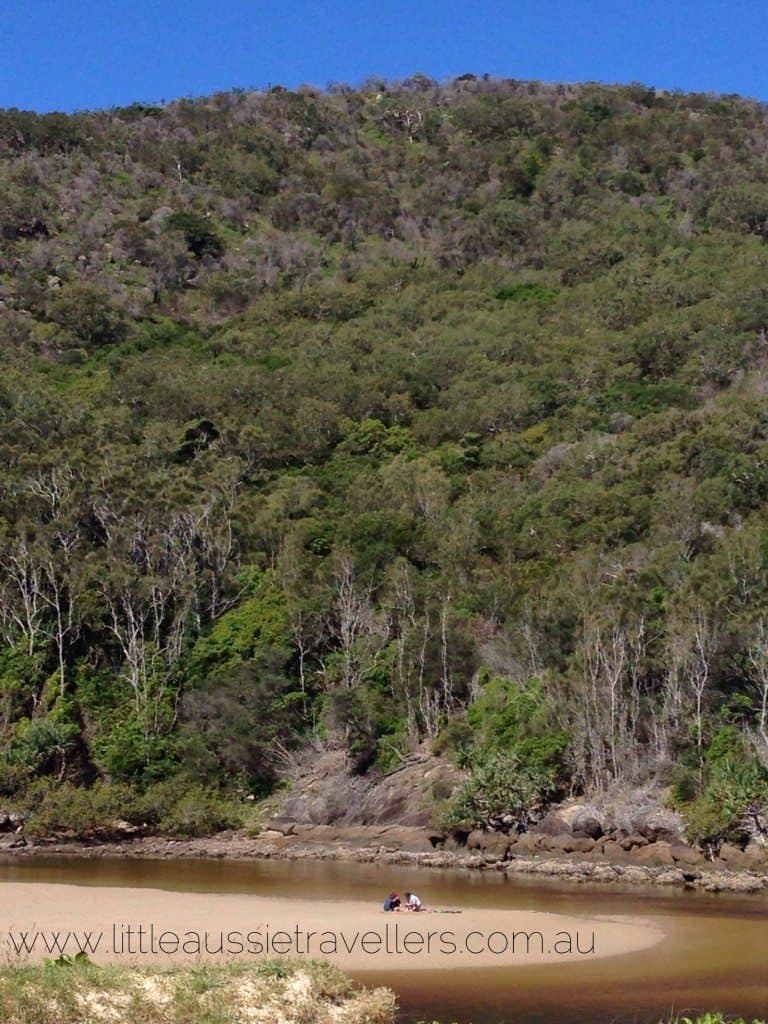
4. Visit the places the tourists go in your home town.
We’d never been to Dolphin Marine Magic despite it being only 1 1/2 hours from home all these years, and when we took the time out to experience it, well we were so overjoyed that we’ve been raving about it to everyone. We did the same with the Port Macquarie Koala Hospital. We’d been once when the kids were quite small, but recently we met up with another travelling fmaily who wanted to take a look through, so we thought it would make a great meeting place and headed out for the afternoon for the free tour. The kids learned new things, so did I, and we donated some money towards a really awesome cause.
5. Make time to explore.
It’s really difficult when you’re balancing work, kids and other commitments to find the time and energy to get out and about. Set aside a day, or even a morning or afternoon to have a mini family break to head out and do something new or even something that’s a long time favourite. It’s amazing when we’re visiting a new area how much time we make for exploring
Do You have tips for travelling at home with kids, and uncovering awesome attractions and things to do?
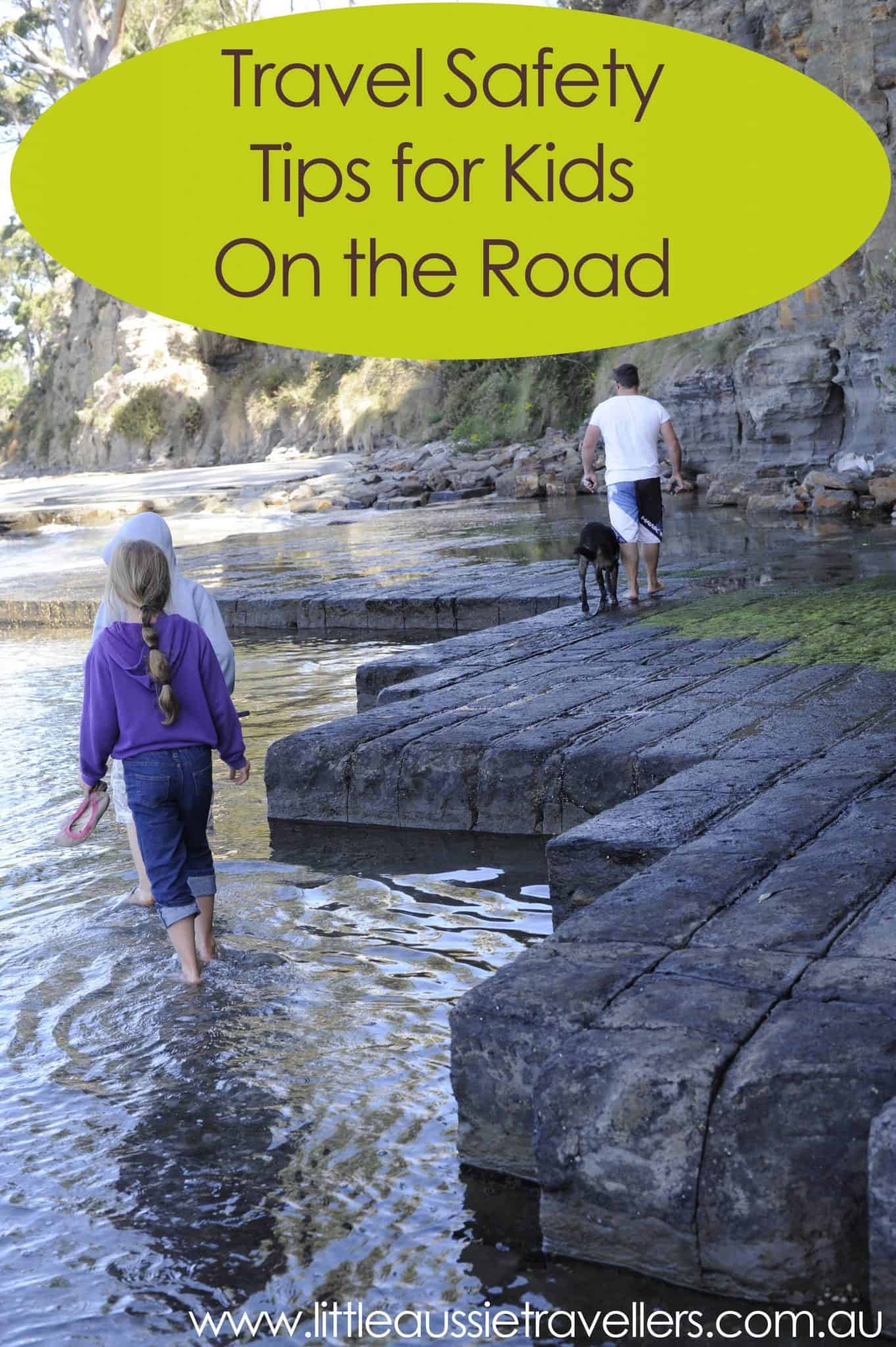
by Loreena Walsh | Family Travel
It’s important for every parent to talk to their children about how to keep themselves safe. Should the worst case happens and you’re child becomes separated from you, then it’s vital that they know what to do, and how to keep as safe as possible until they can reunite with you. We get asked a lot for travel safety tips for kids, so here’s our thoughts.
It’s a sad fact of life that kids go missing across Australia, and while it’s easy to teach kids about safety and danger within their own, regular neighbourhoods, as a family travelling in Australia, it’s important for our children to be street smart and really aware of their own safety and have coping strategies to use should they find themselves scared, lost or threatened.
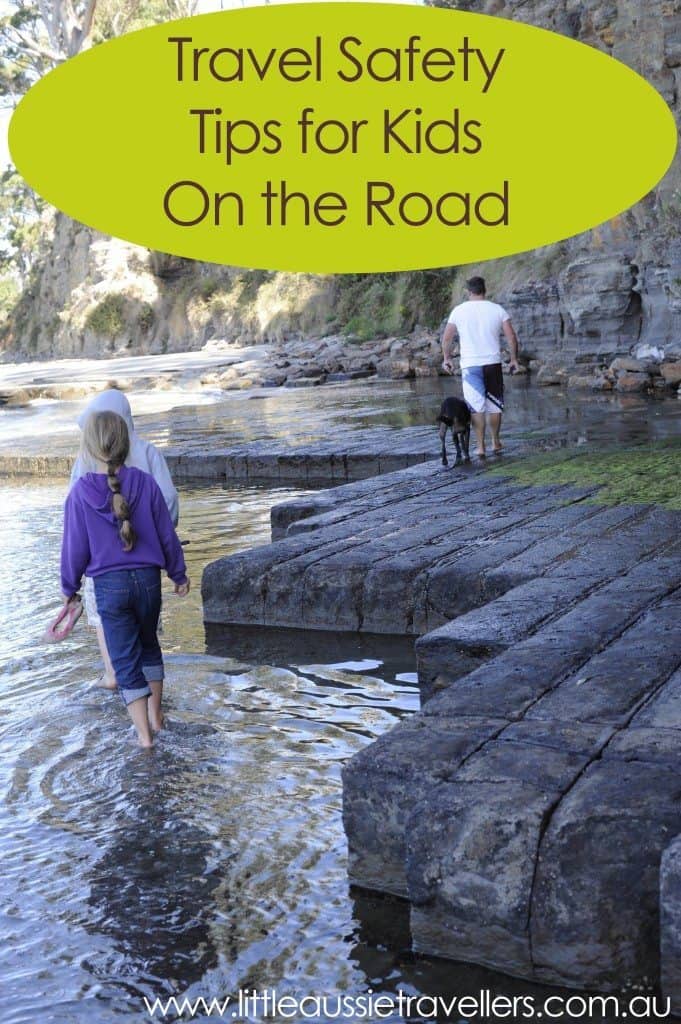
If there is any family that has suffered so publicly and touched the hearts of so many people, not only from Australia, but around the world, then the Morcombe’s are that family. Their son Daniel was abducted and after many years of searching, a man was finally found guilty of his murder. The scary thing is, that the Morcombe family are just like all of us, and I’m sure like so many they never for a single moment believed their world would be turned upside down.
But if there is anyone in the world I admire for their strength, endurance and dedication to changing the world, then Bruce and Denise Morcombe would be those people. The Morcombe’s now spend their time helping to develop programs to teach children about safety, and regularly hosting presentations.
Here’s some tips the Morcombe’s Give to Kids:
“Our son Daniel did not get a second chance. His legacy is that you can learn from this tragic event and make sure it does not happen again. Daniel has given you that second chance.
- When you can, stay with a friend. Even if you have a fight with your mate, don’t go off alone.
- Be observant. Notice who’s around you and what they’re doing.
- Have a family password. Something like your favourite food – lasagne, for example. If a person says they are meant to pick you up, test them on the password.
- With your parents, make a list of 5 adults you trust. If you ever feel uneasy about anybody or anything, tell one of these people and know you won’t get into trouble. If you feel you’re not being listened to, try someone else.
- Don’t share information about yourself, like your hobbies or the name of your school with people you don’t know, online or in real life.
- If something feels wrong, it probably is. Trust the butterflies in your stomach – they could be a sign something’s not right.
- It’s okay to run and scream if you feel threatened. Safety is more important than good manners.”
It’s not a nice subject to think about or talk about, but I know I am super conscious of where my kids are at every second we’re in a new environment, and that’s quite often when you’re out on the road. I’ll be discussing the above strategies with my kids although as we’re not at home some of them won’t be as relevant.
The trick is to be cautious without being fearful, a life lived in fear isn’t a life lived fully is it?
If you’re a family travelling then one thing you will learn is that there are wonderfully kind people everywhere. We seem to be surrounded by amazing, free spirited people who share their stories and experiences with us and others and it truly does open your eyes to the kindness of human nature. But, of course things can happen, whether you’re at home, or on the road and it pays to ensure your children are cautious but not overly fearful.
We set boundaries and use techniques that help our kids stay safe, keep in mind our kids are 11, 9 & 7 and they are mature enough for us to have begun giving them greater responsibility and slowly increase their freedom, if your children are younger, then some of what we do might not apply.
Here’s our tips for child safety when travelling.
- Use small handheld walkie talkies – We purchased these before we hit the road, and they are a great option to give the kids some independence without losing contact of them all together.
- Dogs are great for safety – We have our dog on the road with us, he’s a Kelpie and really friendly, but his best feature is loyalty and I have no doubt whatsoever if anyone tried to harm the kids he’d come straight to their defence.
- Safety in Numbers – Our kids don’t go anywhere alone, if one goes they all go. This helps because of their age and the fact there’s three of them. It would be more difficult with only children of course, but we find this rule works for ours.
- Discretion with Online Info – I rarely post photos or activities that we’re doing on the day or time we’re doing them. Yes, we have a popular travel website and yes we post on social media, but my foremost thought is safety for our kids, so you’ll rarely see us post real time activities unless it’s appropriate.
- Give Guidelines – If our kids are offered something by other travellers, and they often are, then they know they must come and ask our permission first. They know not to enter anyone else’s caravan unless we have approved that and know they are there, and they know to ask before they leave our field of vision.
- It’s important for us to let go as parents. I’m mindful that I’ve always been unapologetically careful of where my kids are and what they’re doing but they are getting older and part of growing up is learning how to operate safeul in the world
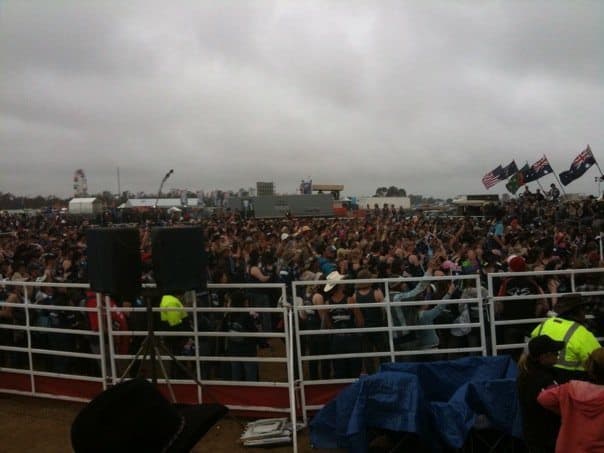
by Loreena Walsh | Family Travel
I’m not quite sure when I realised my parenting choices were starkly different to most of the other parents I knew.
A memorable one, that perhaps shows deeply our philosophies on family travel is where we had three weeks and $10,000 to spend on a holiday, and we were given the advice by most people we knew to go on a cruise, because “there’s always easily accessible childcare there so you can enjoy yourselves”. We both where aghast that people so readily wish to dump there kids for a holiday and could think of nothing worse, so we set off in a tent to explore from Darwin to Adelaide. The kids were 5, 3 and 18 months, we were covered in red dirt for almost the entire 3 weeks, and they probably don’t remember much of it, but we don’t regret that choice at all. I am still sure my spirit wouldn’t have been fulfilled on a cruise nearly as much as it was making those memories with our young family in some of the most breathtaking regions of Australia.
So, it probably came as no surprise to our friends, when we first dragged all three children along to a weekend music festival. In the rain.
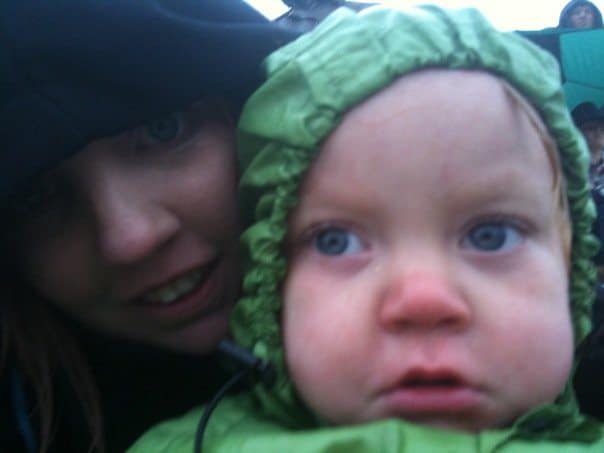
Rugged Up at Deni Ute Muster
Our introduction of live music to our children started quite early. Our eldest spent the night, right through until after midnight tucked snugly in his pram when we went to dinner as new parents, only to discover a wonderful singer, and not wanting to go home, figured as long as he was sleeping and happy, then there was no harm in staying to enjoy the tunes. In fact, all three children danced wildly in my belly at concerts, the first at riverdance when I was around 8 months, the second at dirty dancing the musical, and the third at a Robbie Williams concert. Their love of music was nurtured in the womb.
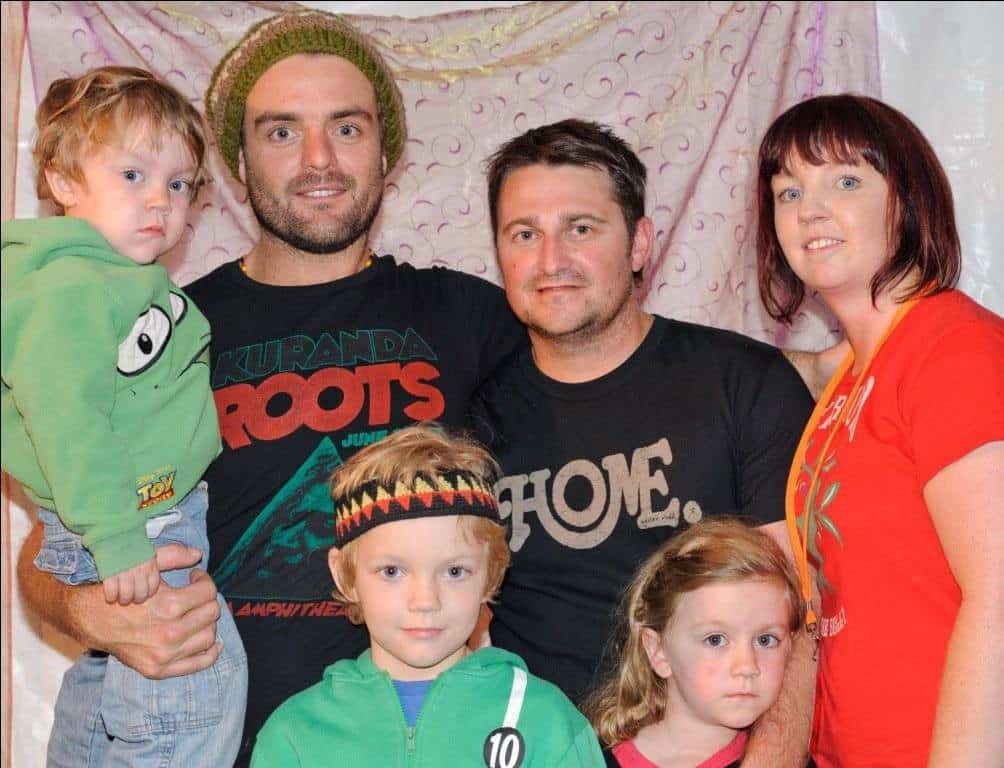
Hanging with Xavier Rudd at FOTSUN
I respect that for many people, taking their children to live music events isn’t something they’d feel comfortable doing, and that’s OK. Like with everything in parenting, the choice is an individual one. For those people who have considered it and just aren’t sure it would work, then we hope to inspire you to give it a go and hopefully you’ll have as much fun as we have over the years, and plan to have for many years to come, enjoying live talent with our kids. At Deni Ute Muster we got to take part in the Guinness Book of World Records Blue Singlet Record in 2009…. The crowd of 2010 currently hold the record and we’d love to get back there to give it another shot!
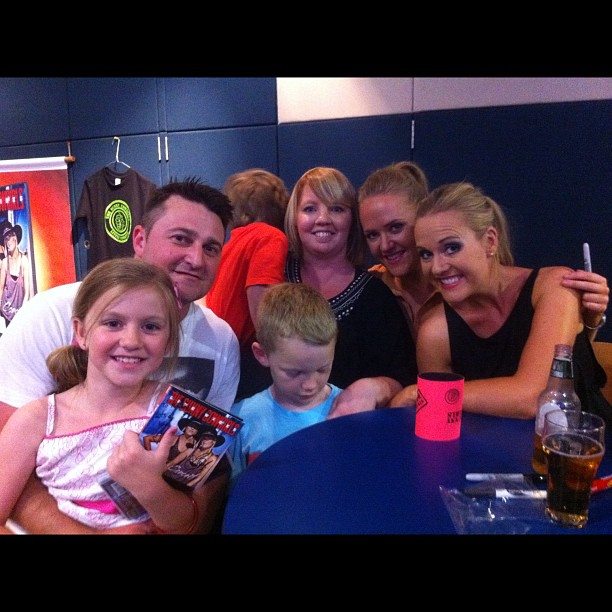
Meeting the Sunny Cowgirls
Key Points for Taking Children to Music Festivals.
- Dress Appropriately – Our weekend in the rain at FOTSUN meant ensuring the kids had great rain jackets, gumboots and plenty of changes of clothing for the guaranteed mud play. For sunny festivals, hats and sunscreen, and layered clothing works well if you’re not sure quite what the weather will do. DENI UTE MUSTER was freezing when we were there, and there were night concerts we wanted to see, so again, warm clothes, waterproof gear and plenty of layers were essential.
- Know the Food Rules – It’s a great idea to check before hand if you’re allowed to take food into a festival. Lots of places expect you to buy food while you’re there. Packing a couple of snacks probably isn’t going to get you in trouble, or if there’s certain things your children are fussy about, or have allergies etc, but don’t plan on packing eskies of food for venues that don’t allow it. Similarly, you’ll likely be able to take a drink bottle in for the kids, but some places don’t allow this either, so always check ticket conditions and FAQ on websites and pack accordingly.
- Don’t Expect to Re-live Your Youth – Yes, music festivals with your children are a great way to expose them to music culture, but don’t expect to be right up front of stage in all the action. Kids will get fussy, sooky, and all the other things kids do, so always do your best to find a comfortable vantage point that allows you to make easy escapes to toilets or to top up drinks and other requirements. Similarly if the kids become rowdy or boisterous, have some respect for fellow concert goers and move to another area where people won’t be inconvenienced.
- Stay in the Family Area – Festivals like FOTSUN and DENI UTE MUSTER offer family areas that restrict alcohol consumption and are made to provide a safer environment for people with children. It’s always a great idea to stay in these areas for overnight festivals where such a section is provided.
- Buy the Correct Tickets – Some festivals and concerts allow kids to enter free with paying adults, others have cheaper pricing for children, and others have age restrictions. If in doubt, always contact the promoter to be sure you won’t be disappointed and not allowed entry on the day.
Mostly, just get out there and enjoy the live music as a family.
During our travels across Australia, there are hundreds of music festivals we’ll be taking the kids to, everything from Jazz, Aboriginal Culture Festivals, to Gympie Muster and Blues Fest which I’ve somehow never quite made it to despite planning to go many years over. Our plans are to attend any festivals that are accessible to us, and to bring to you, how to head out there with your own kids and enjoy each one. We’ll be aiming for hints and tips specific to music festivals, and sharing our love of music within Australia.
As you all know, we’re very inspired by our love of Australia, so hopefully on the way we’ll get to ask some wonderful performers if anything in particular about Australia inspires them!
Have you taken your kids to music festivals? Got any advice to parents considering it? Anything you’d like to know or any festivals you’d like us to cover? Let us know in the comments below:






















